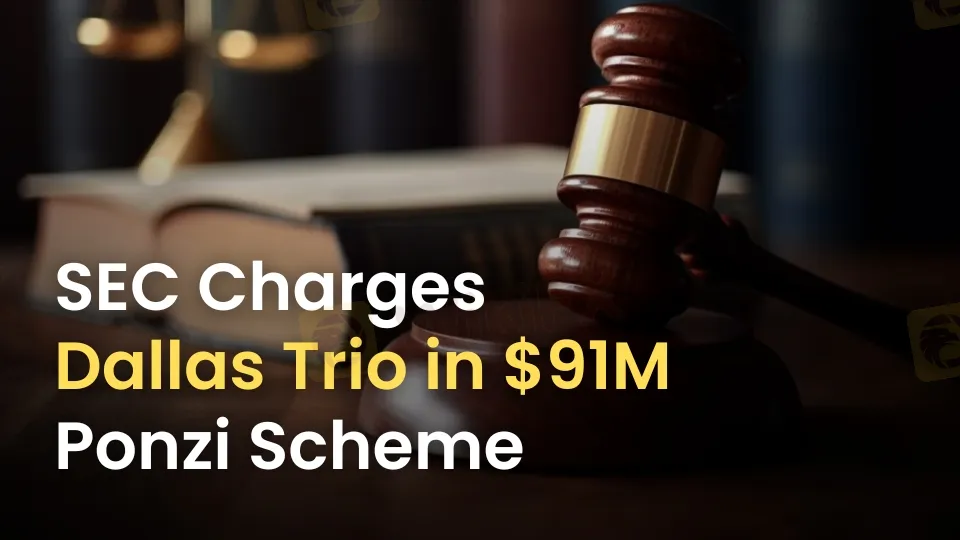简体中文
繁體中文
English
Pусский
日本語
ภาษาไทย
Tiếng Việt
Bahasa Indonesia
Español
हिन्दी
Filippiiniläinen
Français
Deutsch
Português
Türkçe
한국어
العربية
SEC Charges Dallas Trio in $91M Ponzi Scheme Defrauding Investors
Ikhtisar:The SEC charges Kenneth W. Alexander, Robert D. Welsh, and Caedrynn E. Conner for running a $91M Ponzi scheme, promising false returns and misappropriating funds.

The U.S. Securities and Exchange Commission (SEC) has charged three Dallas-Fort Worth residents—Kenneth W. Alexander II, Robert D. Welsh, and Caedrynn E. Conner—with running a massive Ponzi scheme that swindled over 200 investors out of at least $91 million. The fraudulent operation, spanning May 2021 to February 2024, promised lucrative returns but delivered devastating losses.
The SEC alleges that Alexander and Welsh masterminded the scam through the Vanguard Holdings Group Irrevocable Trust (VHG), a supposed powerhouse in international bond trading. They lured investors with “guaranteed monthly returns of between 3% and 6%” and assurances that principal investments would be repaid after 14 months. However, the SEC claims VHG was a sham with no real revenue, propped up by Ponzi-style payments using new investors money.
Caedrynn E. Conner played a key role by funneling over $46 million into VHG through his own entity, the Benchmark Capital Holdings Irrevocable Trust. Together, the trio peddled a fake financial product called a “pay order,” marketed as a safeguard against losses, but the SEC says it was worthless. Instead of generating profits, Alexander and Conner allegedly siphoned off millions for personal gain, including Conners lavish $5 million home purchase.
Sam Waldon, Acting Director of the SEC‘s Division of Enforcement, condemned the scheme: “As we allege, the defendants conducted a large-scale Ponzi scheme that caused devastating losses to investor victims, while Alexander and Conner misappropriated millions of dollars of investor funds.” He reaffirmed the SEC’s resolve to pursue justice for defrauded investors.
Filed in the U.S. District Court for the Eastern District of Texas, the SEC‘s complaint accuses the trio of violating federal securities laws’ antifraud and registration rules. The agency is pushing for permanent injunctions, repayment of illicit profits with interest, and hefty civil penalties to hold them accountable.
This case underscores the dangers of Ponzi schemes masquerading as legitimate investments. Investors were drawn in by bold promises of steady returns and security, only to see their savings vanish. The SECs action serves as a stark reminder to scrutinize too-good-to-be-true opportunities in the financial world.

Disclaimer:
Pandangan dalam artikel ini hanya mewakili pandangan pribadi penulis dan bukan merupakan saran investasi untuk platform ini. Platform ini tidak menjamin keakuratan, kelengkapan dan ketepatan waktu informasi artikel, juga tidak bertanggung jawab atas kerugian yang disebabkan oleh penggunaan atau kepercayaan informasi artikel.
WikiFX Broker
WikiFX Broker
Berita Terhangat
Bagaimana Kondisinya Di 2025? Sekilas Ulasan Broker Indonesia, PT PG Berjangka
IPO Broker Forex, Melambung TINGGI ! Harga Saham eToro Sempat Naik 34%
Sekilas Ulasan Broker Forex Indonesia: PT. Mahadana Asta Berjangka
Rubrik Trade, Broker Yang MENGENDAP Di Daftar Hitam BAPPEBTI
Gunakan JAFeTS NOW, MT4 & MT5, Bagaimana Performa PT. First State Futures Di 2025?
Anda Tahu Tentang PT Mentari Mulia Berjangka ? Apakah Broker Forex Indonesia Yang Aman ?
Belajar Dari KASUS Perdagangan Berjangka Komoditi: OKNUM Broker PT. Solid Gold Berjangka
SFX Salma Markets Broker Forex Legal Atau Ilegal? Trader Indo Gak Bisa WD
Nilai Tukar


